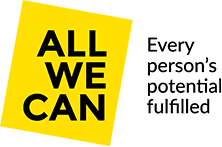Response to the IDC report on the sexual exploitation and abuse of the intended beneficiaries of aid
All We Can welcomes the report from the House of Common’s International Development Committee (IDC) that highlights the need for the aid sector to prioritise rigorous safeguarding policies and procedures that will protect the most vulnerable. Abuse of any description should be reported and met with a ‘zero tolerance’ response.
As the report rightly states, “those receiving aid in humanitarian crisis situations are some of the most vulnerable and disempowered people in the world.” Scrutiny, accountability and transparency should be par for the course, and the aid sector should be subject to all of it. This report follows a committee investigation, and all should welcome that depth of examination.
However, All We Can is deeply concerned that Members of Parliament have chosen to brandish the entire aid sector as “complacent” and “bordering on complicit.” This is sensationalist, reckless and disparaging of the majority of aid agencies and workers who act with legal and moral integrity, including in situations of response to, and reporting of, safeguarding concerns.
The care and protection of people is at the very heart of why the aid sector exists, and those people should be protected and supported to enable them to thrive, and not just survive. The majority of aid agencies and aid workers are deeply committed to working tirelessly, with the support of the faithful public, to end poverty and injustice.
There have been abject failures across the aid sector, and many other institutions. When it comes to safeguarding it is right that challenges are made and significant changes are implemented to make policy and practice even more rigorous. Across all of our society.
Safer cultures are as important as rigorous safeguarding policies and procedures. Sector leaders have the responsibility to not only promote safeguarding but also ensure that it is at the core of what we do and how we do it. All We Can is, and always has been, committed to transparency and to protecting those it serves in some of the world’s poorest communities.
In the last year, prior to any of the news of the current scandals, All We Can had begun a review of its safeguarding policies and practices with the aim of ensuring that our vision of ‘every person’s potential fulfilled’ is as much about our programmes, partnerships and public engagement as it is about ensuring the safeguarding of everyone we engage with either directly or through our local partners and volunteers. All We Can believes that people are more important than projects. This has resulted in even more robust policies and procedures and developing better staff and trustee training on safeguarding.
Graeme Hodge Deputy CEO and designated Safeguarding Protection Officer for All We Can said, “Just having good Safeguarding Policies and Procedures is not enough. We have seen in many of the situations that have hit the headlines, where those robust measures were in place, there was a culture that surrounded those situations that enabled abuse to happen and also meant that it was dealt with inadequately. Ensuring we promote a safeguarding culture in all we do at All We Can, alongside robust policy and practice, is a key part of our ongoing work and strengthening in this area. In that regard, despite the statements from the IDC report, we know that this focus and effort to prepare, prevent, protect and report on safeguarding, is also replicated by many other organisations across the sector.”
Oxfam Chairperson, Caroline Thomson, reflected that this report makes for “painful reading” for the whole aid sector. This does not mean that the whole sector is “verging on (being) complicit” in its abuse. All We Can applauds efforts to shine a spotlight on the damaging, unlawful and harmful practices mentioned in the IDC report. This kind of abuse, and any attempt to cover it up, is never acceptable. Nevertheless, it is deeply disappointing that the report is framed in a way that is so damning of the entire sector – a sector that has also enables and supports protection, transformation and life-saving aid for millions of vulnerable people every year.
‘Do no harm’ should be the operational reality of every organisation and individual serving in the aid sector. The report draws attention to the grossly inappropriate actions of individuals and organisations that work in development and relief. There is always more to do, and the aid sector should never stop improving its policies, procedures, practices and culture to prevent anyone from being harmed in any way, in the work that it does. However, no sector or institution should be summarised in its entirety by the kind of headline-seeking statements that have been spoken and broadcast in these last few days.
The report alludes to the disturbing reality that all sectors of society are affected by abhorrent abuse. Movements such as the #MeToo campaign have drawn sharp and much needed attention to this in recent months. The aid sector is not immune to this, and has a special responsibility to some of the most vulnerable people in our global society. Therefore, as a global society we should ensure justice is served appropriately and without compromise, but this can come without the need to make unhelpful generalisations.
All We Can is, and remains committed to, values and practices that protect the most vulnerable and welcomes a real cross-sector commitment to lasting and demonstrable change. We continue to identify and resource ways we can strengthen and champion a safeguarding culture and practice wherever we work around the world and within our own organisation.
